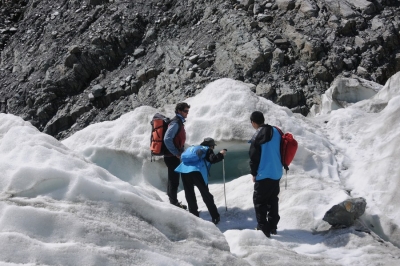2 out of 3 glaciers could be lost by 2100: Study
By IANS | Published: January 6, 2023 05:33 PM2023-01-06T17:33:04+5:302023-01-06T17:55:21+5:30
San Francisco, Jan 6 David Rounce, Assistant Professor of Civil and Environmental Engineering at the US-based Carnegie Mellon University, ...

2 out of 3 glaciers could be lost by 2100: Study
David Rounce, Assistant Professor of Civil and Environmental Engineering at the US-based Carnegie Mellon University, led an international effort to produce new projections of glacier mass loss through the century under different emissions scenarios.
According to a study by Carnegie Mellon University, Rounce and his team found that in a future scenario with continued investment in fossil fuels, over 40 per cent of the glacial mass will be gone within the century, and over 80 per cent of glaciers by number could well disappear.
These glaciers are usually small (less than one km) by glacial standards, but their loss can negatively affect the hydrology in local areas, tourism, glacier hazards, and cultural values.
A temperature rise of more than 2 degrees Celcius will disproportionately affect glaciers in smaller glacier regions such as Central Europe, Western Canada, and the US, and at a rise of 3 degrees Celcius, glaciers in these regions will almost disappear completely, said the study.
Rounce noted that the way in which glaciers respond to changes in climate takes a long time.
He further describes the glaciers as extremely slow-moving rivers.
Changing emissions in the present won't eliminate previously emitted greenhouse gases, nor will it stop inertia that contributes to climate change, so even if emissions are completely stopped today, glacier mass loss is still expected to take between 30 and 100 years to reverse, the study added.
Disclaimer: This post has been auto-published from an agency feed without any modifications to the text and has not been reviewed by an editor
Open in app